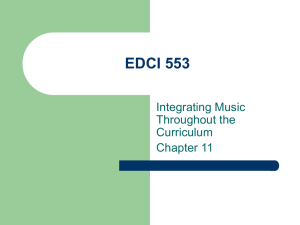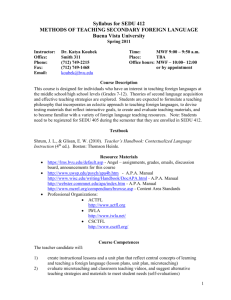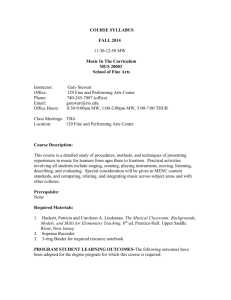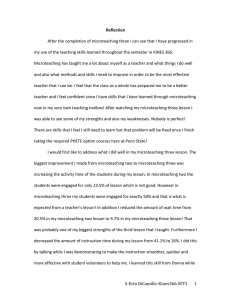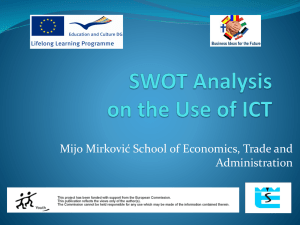Andrew Csizmadia Presentation
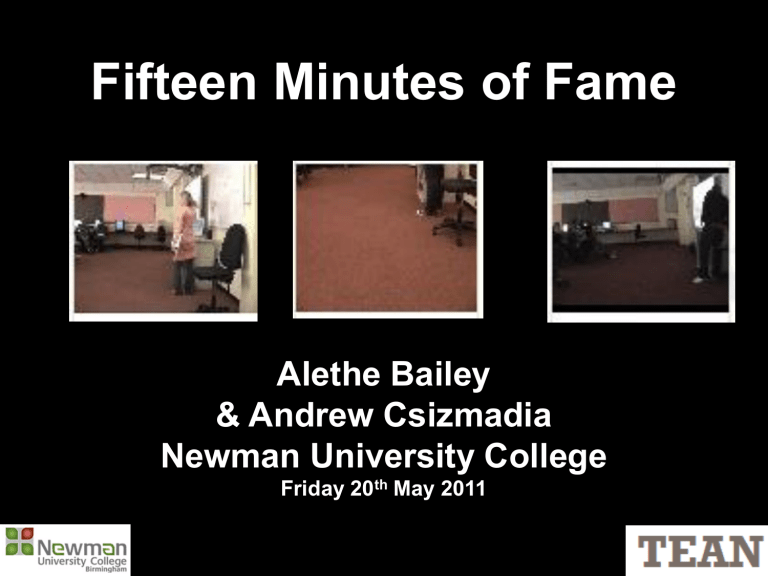
Fifteen Minutes of Fame
Alethe Bailey
& Andrew Csizmadia
Newman University College
Friday 20
th
May 2011
Who, What & Where?
Alethe Bailey
Senior Lecturer in ICT a.bailey@newman.ac.uk
Andrew Csizmadia
Senior Lecturer in ICT a.p.csizmadia@newman.ac.uk
Fifteen Minutes of Fame
Each trainee teacher delivers a
15 minute microteach on a predetermined ICT topic.
Each topic is:
Videoed
Peer reviewed
Tutor reviewed
Self reviewed
"In the future, everyone will be worldfamous for 15 minutes.“
Andy Warhol (1968)
Research Focus
The focus of our study has been:
• How do you develop trainee teachers as critical reflective practitioners?
• How can technology be utilised to assist in the development of trainee teachers as critical reflective practitioners?
Characteristics of ICT in ITE
• The tda has identified 12 characteristics for the provision and use of ICT:
Transfer data
Use digital multimedia technology
Usage of interactive whiteboards
Access to
VLE e-safety training
Linkage with other providers
Web base applications
Where appropriate, trainers and trainees have opportunities to use digital multimedia technology
Documentation online
Modelled by
ITT trainers
Research into innovative use of ICT
Develop e-portfolio
Experience innovative use of ICT
Microteach Roadmap to Date
Individual structured
Microteach introduced
AfL techniques embedded
Vidlog introduced
2005 2006 2007 2008 2009 2010 2011 2012
Microteach
Session
Increased
Microteach
Topics
Refreshed
Tools for the Journey
Likes
Feedback Sheet
Improvement
15m
3m
0m
Process
Peer reviewed
Microteaching
Session
Self reviewed
Tutor reviewed
Produce
Videopaper
/Vidlog
Personal Journey 1
"In the future, everyone will be worldfamous for 15 minutes.“
Andy Warhol (1968)
Personal Journey 2
"In the future, everyone will be worldfamous for 15 minutes.“
Andy Warhol (1968)
Personal Journey 3
"In the future, everyone will be worldfamous for 15 minutes.“
Andy Warhol (1968)
Do I always move so much?
Liam
‘How many times did I say ‘OK!’? I don’t believe it!!’
Mark
I never knew that 15 minutes could be so long..
Atikul
Learners’ Voice Captured
Its made me think where I should stand in front of the room … and not in front of the interactive whiteboard
Farida
Its given me confidence
Raj
Feedback makes senses when I seen myself
George
Technological Issues
• If it can go wrong it will …
• equipment
Lecturers’ Issues
• Memory
• Establish:
• Roles
• Rules
• Routines
• Managing expectations
Lesson Learnt
Student Issues
•The Big Picture
• Preparation
• Time management
• Emotional issues
• Criticality
• focus on the negative not the positive
Review to Date
• How do you develop trainee teachers as critical reflective practitioners?
• Microteach sessions provides the opportunities for individuals to:
• constructively comment on peer’s teaching
• self-reflect on their own performance
• influence own performance through observing others
• take risks within a supportive environment
• be creative
• Can technology be utilised to assist in the development of trainee teachers as critical reflective practitioners?
• Technology captures their ‘15 minutes of fame’ , which their can reflect in their own time from a number of perspectives:
Review to date – 8 Ps
Can technology be utilised to assist in the development of trainee teachers as critical reflective practitioners?
• Technology captures their ‘15 minutes of fame’ , which they can reflect in their own time from a number of perspectives:
• pace
• performance
• passion
• posture
• position
• projection
• participant engagement
• planning
• structure
• subject knowledge
The Neverending Story…
Individual structured
Microteach introduced
AfL techniques embedded
Vidlog introduced
2005 2006 2007 2008 2009 2010 2011 2012
Microteach
Session
Increased
Microteach
Topics
Refreshed
Videopaper to be introduced
The Neverending Story - Videopaper
Vote of Thanks
Vote of thanks goes to the PGCE ICT 2010/2011 group without whom this production would not have been made:
Any
Questions?
References
Allen D.W. & Wang, W. (n.d.). Microteaching ‐ The New Microteaching: Simplified, Variants of
Microteaching,Microteaching Models of Teaching Skills, Microteaching Courses. Available at: http://education.stateuniversity.com/pages/2227/Microteaching.html
(Accessed: 4 May 2011).
Ananthakrishnan , N. (1993) ‘Microteaching as a vehicle of teacher training--its advantages and disadvantages’, Journal of Postgraduate Medicine , 39 (3), pp142-143.
Applebee, A. N. (1976) ‘Microteaching, Component Skills and the Training of Teachers: an
Evaluation of a Research and Development Project’, British Journal of Educational Technology ,
7, pp. 35 –43.
Hauge, T.E. & Norenes , S.0. (2009) ‘Changing teamwork practices: videopaper as a mediating means for teacher professional development’, Technology, Pedagogy and Education . 18 (3), pp.
258-268.
Krumsvik , R. & Smith, K. (2009) ‘Videopapers - an attempt to narrow the notorious gap between theory and practice in teacher education’, Technology, Pedagogy and Education . 18 (3), pp. 258-
268.
Lazarus, E. & Olivero , F. (2009) ‘Videopapers as a tool for reflection on practice as initial teacher education’, Technology, Pedagogy and Education . 18 (3), pp. 258-268.
Lazarus, E. & Olivero , F. (2009) ‘Videopapers as a tool for reflection on practice as initial teacher education’, Technology, Pedagogy and Education . 18 (3), pp. 258-268.
Parker, M. (2009) ‘The use of expanded microteaching for reducing preservice yeachers’ teaching anxiety about mathematics’, Scientific Research and Essay . 4 (9), pp. 872-880.
References
Rich, P.J. & Hannafin, M. (2009) Video annotation tools: technologies to scaffold, structure and transform teacher reflection, Journal of Teacher Education . (January).
Säljö. (2009) ‘Videopapers and the emergence of analytical perspectives on teaching practices’,
Technology, Pedagogy and Education . 18 (3), pp. 258-268.

